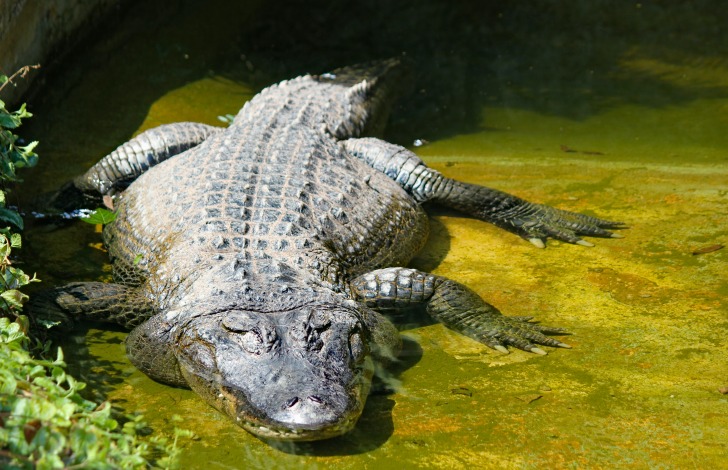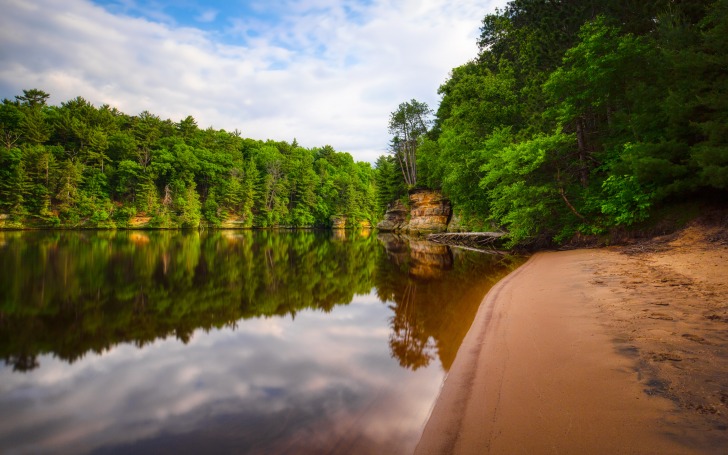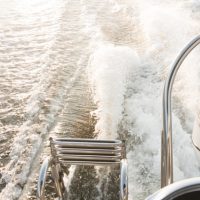While the state of Wisconsin is not typically known as a hotbed for alligators, that does not mean that there are none to speak of at all.
According to wildlife officials who monitor the state’s alligator population, at least one alligator can be found in this location each year.
Unfortunately, they are not able to survive the harsh winters and it is not advisable for residents to bring them to this climate.
To find out more about the Wisconsin alligator population, be sure to read on.

Contents
So… Are There Alligators in Wisconsin?
In the wake of recent news stories about the number of alligators that seem to be wandering around the state, it is easy to see why there may be false perceptions about the state’s level of alligator presence.
Like many states that do not have a naturally occurring alligator population, alligators will pop up because some will still attempt to keep them as pets.
For example, one of the alligator encounters that took place in Wisconsin this summer happened because someone had their pet alligator outside sunning themselves in a kiddie pool.
Eventually, the alligator hopped out and decided to do some exploring.
Meanwhile, there was another situation where children discovered an alligator in Long Lake.
It is believed that these alligators were either released into the lake by a past owner who could not care for them anymore or they were able to escape from their containment.
These stories account for most alligator sightings that occur within the state of Wisconsin.
It is not a state that alligators are going to be spending time in willingly.
Unless they are brought to the state by a pet owner, they are not going to be found.
As most would expect, there is no real way for them to survive the winter.
That’s why alligator ownership is only advisable for those who have the ability to recreate a living environment that resembles their natural habitat.
Obviously, this is easier said than done.
Alligator Species in Wisconsin
When these random sightings take place within the state of Wisconsin, they will always involve the American alligator.
Even in climates that are more hospitable to the alligator, the American alligator is the only species that is going to be found on American soil.
Texas, Oklahoma, Arkansas, Louisiana, Mississippi, Alabama, Florida, Georgia, South Carolina, and North Carolina are more common locations.
Yes, they can be found in any form of fresh water, which is why they make periodic appearances in Wisconsin.
Wetlands with more abundant food sources are more palatable to the alligator but that does not mean that they will never be found in Wisconsin.
The reason for their presence will vary on a case-by-case basis but in most instances, they are brought to the state by an exotic pet owner.
Is it Safe to Swim in Wisconsin?
Since the state has had multiple alligator sightings within the past summer, it begs the question: is Wisconsin a safe state for swimmers?
Alligators are not typically a concern because their presence tends to be an aberration.
That does not mean that there are no concerns that need to be addressed, though.
Wisconsin swimmers must still take the time to pay attention to the local reports and make sure that they are not swimming in waters where bacteria and poisonous algae blooms are being given the chance to flourish.
The Wisconsin Department of Natural Resources is an invaluable resource in this department.
They will let you know if any beaches that you plan on visiting have been shut down or if there are any additional warnings about the waters in question.
Wisconsin beaches all across the state are tracked by the Department of Natural Resources.
The DNR relies on a combination of thorough testing and advisement from local partners.
From there, notifications are created that let everyone know when their health could potentially be at risk.
Chemical spills, increased levels of e.coli bacteria and poisonous algae blooms are common causes of closures and warnings.
The Environmental Protection Agency also provides valuable warnings about potentially impaired waterways.
Interesting Alligator Facts In Wisconsin
There are not many alligators to be found within the state of Wisconsin but that does not mean that there are no interesting myths or legends to speak of.
There are all sorts of monsters and creatures dwelling beneath the surface if you let certain people tell the stories.
Some of them are intriguing, others less so. Every state has its own legends and myths and Wisconsin is no different.
Lake Winnebago is the setting for the most commonly told tale.
According to the Winnebago Tribe, the Lake Winnebago Water Monster is a massive fish that would gobble up moose, elk, and deer that it comes across.
Do we think that this creature will cause problems for local swimmers?
Probably not but its presence bears mentioning, of course.
Some believe that this monster was actually a colossal sturgeon, while others believe that the original monster has given birth to descendants.
Who knows?
If you spend enough time at Lake Winnebago, you just might end up running into one.
Meanwhile, Lake Mendota is said to have its very own sea serpent.
His name is Bozho and is said to be a giant snake that has tipped over a number of canoes.
Swimmers and sunbathers are also said to have seen the creature.
However, locals believe that Bozho means well and he is said to have never hurt a human.
He is also believed to be a plesiosaur, a reptile that has been extinct since the Mesozoic Era.

Alligators vs. Crocodiles
There are many who have bought into the idea that alligators and crocodiles are relatively the same but there are key differences that need to be discussed.
Neither will typically be found in the state of Wisconsin unless they have been placed there.
Crocodiles are not even found in America, in the vast majority of instances.
Alligators prefer to spend their time in the southeastern states of the US, where marshland is plentiful and there is no shortage of food sources.
A crocodile would win the fight against an alligator in most cases as well.
Alligators are much more opportunistic from a hunting standpoint, while crocodiles rely on their superior hunting skills.
The alligator also has a darker coloration than the crocodile.
They are blackish grey, while the crocodile is light olive green.
One of the more pronounced differences between the two has to do with the snout.
Crocodiles have a V-shaped snout that is more pointy, while the alligator will have a U-shaped snout that is wider.
3 Safety Tips for Swimming in Alligator-Infested Waters
1. Stick To Designated Areas
In many instances, the areas of a body of water that are most susceptible to alligator infestations have already been roped off, with the safety of the swimmer in mind.
There is absolutely no reason to venture into these waters.
If an area has been designated unsafe, that means that the proper research was done and it is being closed off for your own safety.
No, you cannot rely on the buddy system in these instances.
There is no way to guarantee your safety if the area has already been designated or roped off.
Adhere to these warnings and stick to the areas that are considered the safest.
2. Don’t Swim In The Dark
The darkness (or even dusk) is not a safe time to swim.
Alligators are not looking for humans to attack but if they are venturing into their waters during dark or dusk?
This is not advisable.
These reptiles do not attack unless they are feeling cornered.
Think about it this way: would you like to have people venturing into your chosen area once you have settled in for the night?
Probably not, right?
Alligators are not much different in this regard.
If you stay away from them, they are typically going to stay away from you.
3. Monitor Pets and Children
Pets and children need to be watched closely in these scenarios so that they are not making an excessive amount of noise.
Yes, the fact that your child or dog is splashing about in shallow waters is not a particularly harmful act in and of itself.
However, this serves as a call to alligators who are looking for an easy meal.
Alligators are more likely to attack when they believe that their prey is wounded.
Splashing around in this manner leads an alligator to believe that they have found what they are looking for.
That’s why children and pets need to be watched closely, even if they are frolicking in shallow waters.
Summary
Wisconsin is not a state where residents or visitors will really have to worry about alligators.
They can be found in this state occasionally but there is a reason why each of these encounters is newsworthy.
It’s because they are not something that the average resident is ever going to come to expect.
Of course, there are still other considerations that must be made.
Alligator encounters may still take place, even if the climate is not hospitable.
In addition to the alligator-related concerns, Wisconsin residents and visitors must also pay close attention to any news about beach closings or potential waterway issues.
Bacteria exposure can be harmful, as well as poisonous algae blooms.
Fortunately, Wisconsin’s bodies of water are being tested on a consistent basis.
Swimmers simply need to be paying attention to the advisories and the rest will take care of themselves.
Wisconsin Safety Overview
READ THE FULL REPORT: Wisconsin Safety Review
Safety Index:
- OVERALL RISK: MEDIUM
- TRANSPORT & TAXIS RISK: MEDIUM
- PICKPOCKETS RISK: MEDIUM
- NATURAL DISASTERS RISK: MEDIUM
- MUGGING RISK: MEDIUM
- TERRORISM RISK: MEDIUM
- SCAMS RISK: MEDIUM
- WOMEN TRAVELERS RISK: MEDIUM
Frequently Asked Questions
What Are Wisconsin’s exotic animal laws?
Wisconsin is one of the few states in the country that does not have any laws on the books that govern the keeping of exotic animals.
While efforts have been made within the state’s legislature to ban their ownership, none of them have been able to pass.
The lack of these laws is linked to the random alligator encounters that take place on a consistent basis.
What are my chances of being attacked by an alligator?
Because pet alligators have been known to make their way into the world around them, we cannot say that the answer is zero.
However, it is slim to none.
Even in instances where alligators are found among the population, attacks typically do not take place.
They are not animals that are typically looking to strike back against humans.
Is licensing required to own an exotic animal?
Those who are looking to own an exotic animal, such as an alligator, will need to make sure that they are obtaining the proper licensing.
If there are any questions, the Department of Natural Resources will let you know which license works best for your needs.
You’ll need to let them know what animal you are looking to take in and what you plan on using the license for.












Alligators are not typically found in Wisconsin, but occasional sightings occur due to pet owners releasing them or escapes from containment.